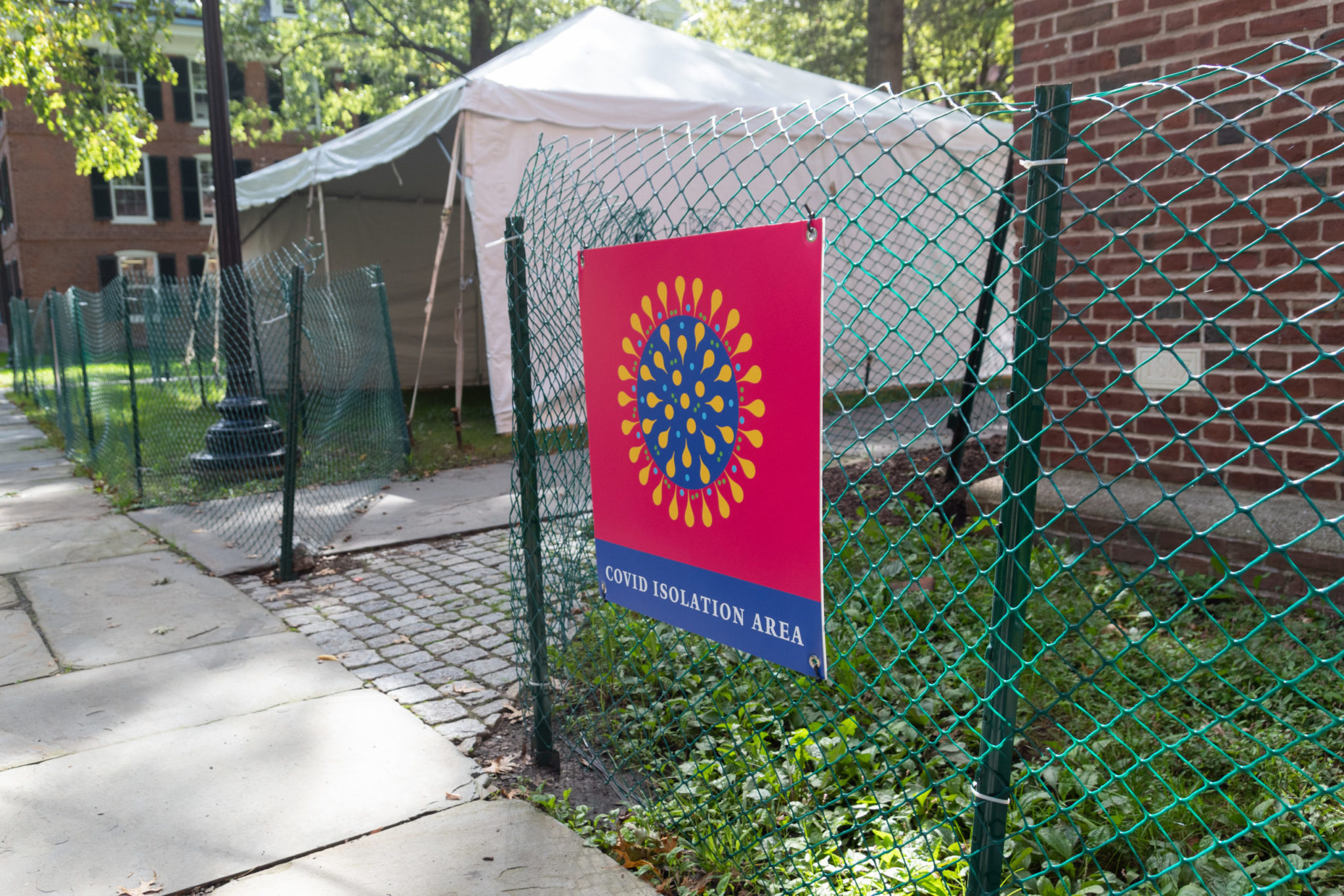Yale’s COVID-19 alert level shifts to green
University COVID-19 Coordinator Stephanie Spangler announced in a Thursday email that the University’s COVID-19 alert level had changed from yellow to green, accompanied by the relaxation of several public health restrictions.

Zoe Berg, Photo Editor
Yale lowered its COVID-19 alert level to green on Thursday afternoon after nearly three months at the yellow alert level. The shift will allow for some indoor gatherings to be held without prior approval.
University COVID-19 Coordinator Stephanie Spangler wrote an email to the Yale community announcing the shift from yellow — denoting low to moderate risk — to green, denoting lower risk. University officials made the decision based on low campus case levels in recent weeks, according to Spangler. The move will allow the Yale community to “cautiously relax” some pandemic-related decisions, she said.
“Once again, thank you for your deep and sustained commitment to keeping our campus as safe as possible,” Spangler wrote in her email. “It is that shared commitment and the efforts of so many that have allowed us to go green.”
According to the Yale COVID-19 data dashboard, vaccination rates have inched even higher in recent weeks, with Yale College logging an undergraduate vaccination rate of 99.6 percent and a faculty vaccination rate of 97.1 percent as of Nov. 1. Cases have stayed correspondingly low: based on the past seven days of data, the undergraduate positivity rate is 0.07 percent and the faculty and staff positivity rate is 0.06 percent.
University leaders determine alert levels in collaboration with Yale’s public health experts, according to Spangler. That group considers several metrics in its deliberations, including infection rates both on campus and in the New Haven area. The last change to the alert level occurred on Aug. 9, when it shifted from green to yellow in response to a surge of the Delta variant.
Spangler noted that while state and federal agencies also employ color-coded alert systems, those agencies often measure different metrics applicable to bigger communities than Yale’s.
“I am endlessly grateful to the Yale student body, faculty and staff for their efforts in keeping our community safe,” Jordi Bertrán Ramírez ’24, Yale College Council Director of Health and Safety Policy, wrote to the News. “This news is incredibly hopeful!”
With Yale’s campus alert level at green, several things will change. According to Spangler’s email, policies surrounding events, gatherings and meetings have been altered so that Yale affiliates can host events without gaining prior approval in many instances.
There are still some parameters: events must still be held in Yale buildings — and in spaces that meet relevant facility-capacity requirements — and include only Yale students, faculty, staff and trainees.
“Events … are essential to our university and its normal functioning,” global health professor Howard Forman said in an interview with the News. “We have done extremely well with adapting to many virtual events. But, as I was reminded yesterday while attending a larger event indoors at the medical school, in-person interactions are an important part of our lives and work.”
Spangler’s email also announced that non-Yale spectators will be allowed to attend indoor performances and competitions in accordance with COVID Review Team-developed criteria. Spangler added that to schedule this type of event, community members should consult their respective health and safety leader.
Bertrán Ramírez said that the YCC is committed to ensuring that the next few weeks can return to “as normal as possible” while keeping the Yale and New Haven communities safe, pointing specifically to upcoming a cappella fall jams, dance showcases and improv shows. He said the YCC will continue advocating for “less stringent” COVID-19 policies where appropriate.
Spangler’s email also included an update that food served at gatherings no longer needs to be prepackaged.
“From a sustainability standpoint, the elimination of pre-packaged foods will help us mitigate a sea of waste that has ensued from the COVID-19 pandemic,” Bertrán Ramírez wrote to the News. “More generally, it will ease a lot of the challenges that come with organizing the logistics of pre-packaged foods, but also will allow student groups to support local New Haven businesses for whom pre-packaging food is not realistic or possible.”
Another eliminated requirement is the expectation that vaccinated individuals mask outdoors, according to Spangler. She noted that exceptions still apply in “dense social gatherings.”
Something that is not changing: indoor masking requirements. Spangler reiterated that all individuals, regardless of vaccination status, must still mask indoors while in the presence of others. She explained that Centers for Disease Control and Prevention guidance calls for indoor masking regardless of vaccination status, as does a recent White House directive.
“I think masking is complicated by so many competing government policies and rules,” Forman said. “But I would imagine it will get relaxed. But given that we have to get through Thanksgiving travel and return, it may have to be deferred until early in spring semester.”
The University’s last green COVID-19 alert level lasted from Jun. 4 to Aug. 9.








